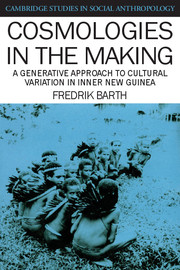Book contents
- Frontmatter
- Contents
- Foreword by Jack Goody
- Map: Major territories of the mountain Ok
- 1 The problem
- 2 An attempt at systematic comparison: descent and ideas of conception
- 3 The possible interrelations of sub-traditions: reading sequence from distribution
- 4 The context for events of change
- 5 The results of process – variations in connotation
- 6 Secret thoughts and shared understandings
- 7 The stepwise articulation of a vision
- 8 Experience and concept formation
- 9 The insights pursued by Ok thinkers
- 10 General and comparative perspectives
- 11 Some reflections on theory and method
- Bibliography
- Index
- Cambridge Studies in Social Anthropology
2 - An attempt at systematic comparison: descent and ideas of conception
Published online by Cambridge University Press: 05 June 2012
- Frontmatter
- Contents
- Foreword by Jack Goody
- Map: Major territories of the mountain Ok
- 1 The problem
- 2 An attempt at systematic comparison: descent and ideas of conception
- 3 The possible interrelations of sub-traditions: reading sequence from distribution
- 4 The context for events of change
- 5 The results of process – variations in connotation
- 6 Secret thoughts and shared understandings
- 7 The stepwise articulation of a vision
- 8 Experience and concept formation
- 9 The insights pursued by Ok thinkers
- 10 General and comparative perspectives
- 11 Some reflections on theory and method
- Bibliography
- Index
- Cambridge Studies in Social Anthropology
Summary
Since I thus reject the three procedures that I find characteristic of contemporary social anthropological treatment of problems such as those raised by Ok ritual and cosmological variation, I am forced to proceed more patiently and construct my own methodology through a stepwise, tentative description and analysis. For this, we need some kind of systematic procedure for representing the forms, and ordering them in relation to each other with respect to morphological features: we need a comparative methodology. It is a striking fact that, great as the emphasis has always been in anthropology on presenting our discipline as comparative, there is no established procedure which could be named ‘the comparative method’ (cf. Kuper 1983: 197ff). Comparative exercises have been pursued from very different premises and with very different purposes in mind. A range of descriptions may be laid out to build a taxonomy; the presence/absence of features may be mapped to depict distributions, often as a basis for constructing a quasi-history of cultural diffusion based on the age-area hypothesis; or a few cases may be idiosyncratically selected and compared, to illustrate structural contrasts or similarities.
- Type
- Chapter
- Information
- Cosmologies in the MakingA Generative Approach to Cultural Variation in Inner New Guinea, pp. 10 - 17Publisher: Cambridge University PressPrint publication year: 1987



